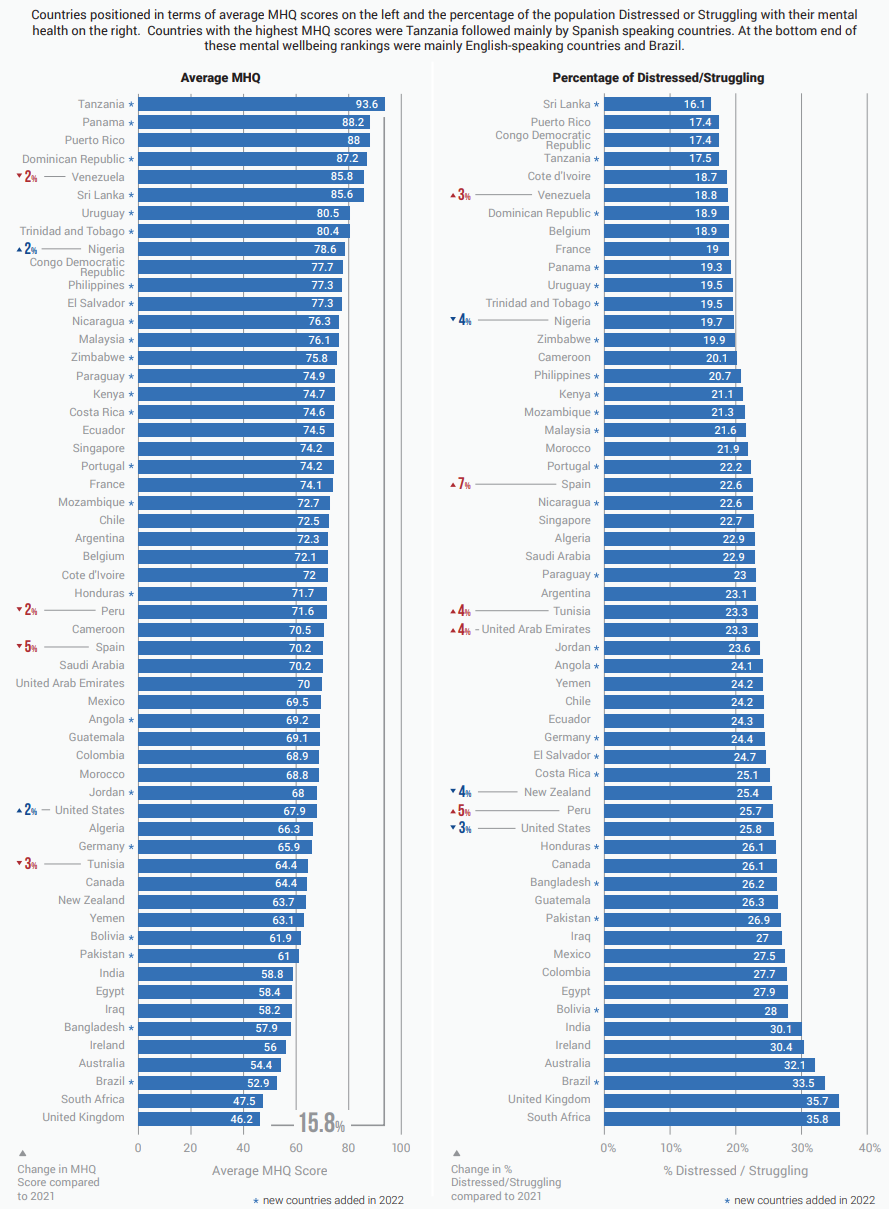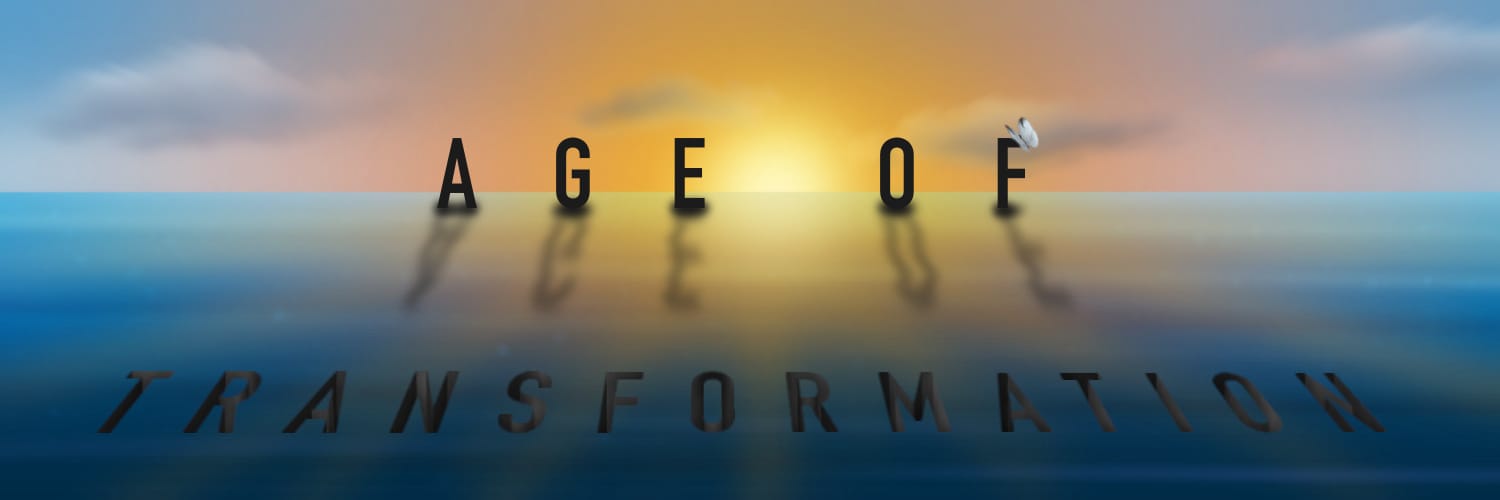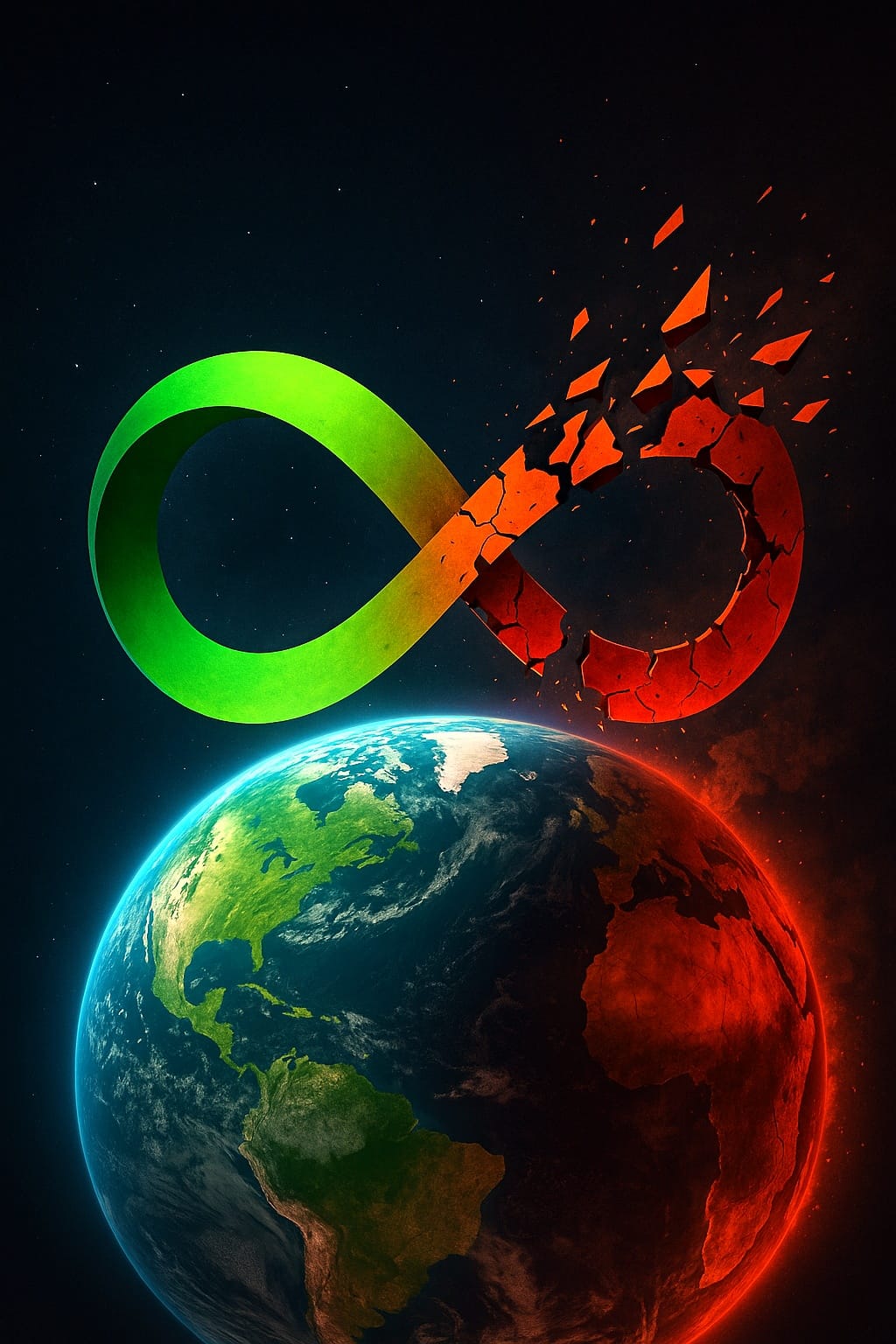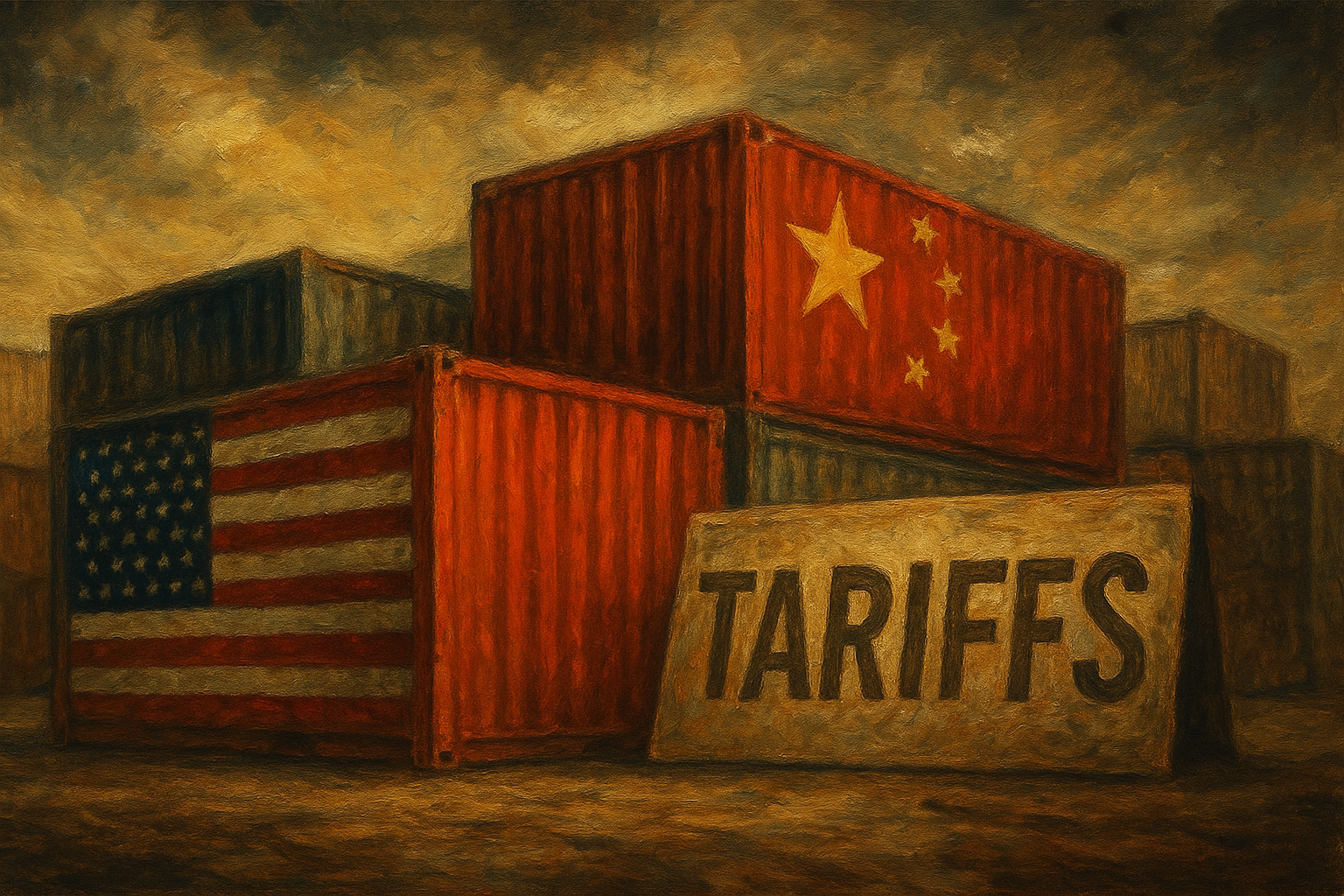I am often asked, ‘What do we do in response to the climate crisis [or insert whichever particular crisis you want]?’ 'How do we organise politically?' 'How do we counter the fossil fuel industries?' 'How do we resist vested interest lobbying?' 'How do we influence the right people?'
These are all critical questions I’ve grappled with for some time. And we will certainly be exploring them more deeply at AoT.
But what if the answer is not as simple as just ‘doing something’? What if the questions to some extent overlook far deeper issues that strike at fundamental, existential issues?
The crisis ‘out there’
Climate change represents an unprecedented global crisis. It is also an existential one, because the best evidence shows that even at current levels of emissions, we risk triggering various ecosystems on the planet to move in self-reinforcing feedback cycles which, at worst, could coalesce into a ‘hothouse earth’ scenario. Earth systems are so complex that with our current levels of knowledge we cannot tell whether we have actually activated these runaway processes / which is why it’s so important to dampen down on them immediately to reduce that risk.
That devastating possibility was outlined by a global team of some of the world’s best climate scientists, in a major paper published in the Proceedings of the National Academy of Sciences, one of the world’s most respected journals.
At worst, the ‘hothouse’ scenario “poses severe risks for health, economies, political stability (especially for the most climate vulnerable), and ultimately, the habitability of the planet for humans,” the paper concluded. It represents, in other words, the possibility of human extinction and therefore highlights in no uncertain terms the depth and gravity of ‘the problem’: human activities, our current mode of being on this planet, are driving us to destroy the very planetary life-support systems that we depend on to survive.
That suggests that there is something deeply, fundamentally wrong with the human condition in its current form.
But the crisis of global heating is only one of the crises we face. As the planetary boundaries framework makes clear, the climate system represents just one planetary boundary that we are currently breaching at breakneck speed. Out of nine others, we are already in breach of six, and rising.
We are facing a wider ecological crisis encompassing air, land, water and biodiversity. On all fronts and more, we are in the red.
And of course, we’re not just in the red on the environment. We are simultaneously facing major crises across our systems of production in energy, the economy and food. These crises encompassing our material social relations are paralleled by deep and overlapping inner crises.
That perhaps is the most significant crisis of all because even though that is the crisis with which we as individuals may well be more intimately familiar – because it’s truly ‘our’ crisis’ (the one we have to live with and cope with everyday) – it takes us a while to get to it: Our gaze is often focused on the crisis ‘out there’ and what we must do to ‘fix it’. Sometimes we neglect or overlook the crisis within. Other times, that inner crisis might consume us and distract us from what’s going on ‘out there’.
In short, among the multiple, overlapping global crises we are facing are multiple crises of the mind. We are witnessing numerous simultaneous epidemics of mental health disorders which speak to the extent to which our inner lives are increasingly tormented and traumatised by the world we have created around ourselves.
The inner crisis
The latest Mental Health State of the World report published by Sapien Labs’ Mental Health Million Project suggests that over recent years we appear to be crossing a global tipping point. The report’s core finding – that mental health is now largely deteriorating for younger generations compared to older ones – is sobering.
The report, based on the world’s largest global database across 64 countries, finds that “young adults age 18-24 were five times more likely to have mental health challenges compared to their grandparents' generation. This pattern, apparent even prior to the pandemic, represents a sharp reversal of patterns documented prior to 2010, indicating a dramatic decline in mental wellbeing with each younger generation rather than an increase in wellbeing as we age”.
The report refers to a metric called the ‘Social Self’, which measures how “we see ourselves and our ability to form and maintain relationships with others”. It finds that this metric displays the “most dramatic decline from older to younger generations”. One major driver of these trends is that family relationships and friendships have experienced “progressive degradation over generations: “Younger adults report increasingly higher rates of family instability and conflict and lack of love and emotional warmth during childhood, despite growing rates of material support by their parents and investment in their accomplishments.”
As a result, younger adults are three times more likely to have poor adult family relationships compared to their parents’ generation and twice as likely to lack friends who will help them in times of need. This is directly correlated with poor psychological health, because people with poor family relationships and no close friends “are ten times more likely to suffer from significant mental health challenges” compared to those with many close family bonds and friendships.
Another major finding is that mental health challenges are increasingly concentrated in some of the wealthiest and most industrialised countries which adopt the more extreme neoliberal economic policies. Although this isn’t a strict rule, it’s notable that countries like Britain, Australia and the United States find themselves at the lower scale of mental health, and the highest percentage of people who report being mentally distressed and struggling.

Reinforcing this point, the report concludes:
“While many factors such as the Internet are likely to contribute to the diminishing Social Self and bonds of family and friendship, one significant factor may also be cultural trends in parenting that trade off warmth, love and stability for greater focus on material comfort and accomplishments.”
There is a direct link, in other words, between the extent to which we are driven by the imperatives of the prevailing system toward material accumulation and achievement, and our psychological derangement.
And amidst all this, many of our existing political institutions are either complicit in these crises, or apparently impotent to respond to them.
The crisis of meaning
Before we ask what to do, then, we need to understand what is actually happening. Because we are not just facing a climate crisis. We are facing a poverty crisis, a political crisis, crises of education and health, crises of culture and infrastructure. And within and encompassing all of these, we are facing a crisis of meaning, because in a world that feels like it’s crumbling around us, we are sometimes overwhelmed by feelings of emptiness and futility.
Professor John Vervaeke, a cognitive scientist at the University of Toronto, calls this “the meaning crisis”. Our conventional sense-making concepts and categories are broken.
This is a fundamental rupture among human beings, and between human beings and the earth system. These crises are all signals that the problem goes far deeper than just one component of one system; that the human system as a whole is deeply out of sync with reality.
So before we ask the question of what do we ‘do’, we need to look at ourselves and confront the fact that what we are witnessing requires a different response. We need to ask, ‘what is it about our way of being in the world that has produced this state of chaos that is impacting my life, the lives of those I love, the lives of those around me and the lives of those beyond us?’
As these crises escalate and as these systems fail, we are watching in real-time as the prevailing norms, value systems and worldviews that we have constructed to make sense of our place in the world and regulate our behaviours are no longer working.
The prevailing ideological and cultural paradigm that defines human civilisation today is dysfunctional and destructive.
As an empirical test, we cannot get a clearer result that this paradigm is simply wrong. Which leads to the conclusion that what we are facing is a spiritual crisis – spiritual because it strikes at the heart of our values and our sense of what life means to us.
Because it shows that the overarching paradigm that underlies the global system, however useful it might have been, is not only obsolete, but actively pushing us toward self-annihilation. This paradigm reduces human existence to competition between disconnected, materially-defined units whose primary imperative is individual material self-maximisation and accumulation. Yet it is precisely this way of being that is eroding our mental health and destroying planetary life-support systems. Our inherently relational nature, the fact that our well-being is tied up with our connections to others – that we are fundamentally interconnected – is obfuscated.
Moving through the global phase-shift, then, requires us to completely reorient ourselves into a new way of being in the world, rooted in new ways of understanding our relationship with the world that actually connect with reality.
Emerging paradigm shift
It is crucial to know, then, that exactly during this period of turmoil new scientific frameworks are emerging which point to the emergence of a new paradigm grounded in cutting-edge advances in biology, physics and systems sciences.
In physics and biology, a new book by cognitive neuroscientist Dr Bobby Azarian, The Romance of Reality, draws on decades of complexity science breakthroughs to show how a holistic view of life and the cosmos has emerged that eliminates old industrial reductionist paradigm views, and opens up a new perspective on human purpose.
Within the field of consciousness studies, the Academy for the Advancement of Postmaterialist Sciences showcases the work of thousands of scientists publishing peer-reviewed research suggesting that consciousness is a fundamental component of reality.
The Institute of Applied Metatheory builds on the work of philosopher Ken Wilber who developed the outlines of an integral metatheory to understand human evolution through an integrated lens that views biology, psychology, society, culture and spirituality systematically and holistically.
These are just a few snippets of a new post-industrial paradigm that is emerging haphazardly, organically but relentlessly around the world, one that could help us truly reorient ourselves.
The global information phase-shift
To understand this global informational phase-shift, we need to understand the critical role of information in all phase-transitions.
Evolutionary biology teaches us that when a complex adaptive system is particularly challenged by its environmental conditions, it enters a stage of crisis. The crisis challenges the existing structures, the existing relationships and patterns of behaviour in a system. If the crisis intensifies, it can reach a threshold that undermines the integrity of the whole system. Eventually, either the system adapts by re-structuring, leading to a ‘phase shift’ to a new system, a new equilibrium — or it regresses.
If a living system fails to process information from its environmental conditions and translate this into adaptive action, this incoherence means it will be unable to adapt to those conditions, because it cannot recognise them. It will therefore collapse.
In a civilisational context, the capacity to process information in such a way that it is distributed effectively across the system to contribute to resilient relationships is crucial to the system’s ability to survive, and adapt. In this sense, the state of our global information, communications and media systems presents an insightful barometer of the 'health' of our civilisation's cultural and organisational DNA.
It doesn’t matter which side of the political spectrum you sit on. We are all feeling it, acutely — a deep sense of acceleration and polarization, signalling that our information sensors are in increasing disarray, overwhelmed, unable to cope with and meaningfully process the avalanche of seemingly contradictory, confusing and frightening data entering our consciousness. All of that speaks to the inability of the prevailing reductionist-materialist ideology and the social-operating systems linked to it, to make sense of the world and reality.
The state of information overload and polarisation we are now experiencing speaks to the fact that we are rapidly approaching a global systemic crisis threshold. The crisis has overwhelmed the existing structures of the global system. Our prevailing institutions and systems of power are in informational disarray as they struggle to make sense of what appears to be an overload of information signalling this systemic crisis.
At this threshold, constrained within the ideological strictures of the incumbent paradigm, the system faces a crisis of information overload, and an inability to meaningfully process the information available into actionable knowledge that can advance an adaptive response. Hence, for instance, the increasingly toxic polarisation of all political discourse.
Tools like artificial intelligence do not in themselves offer solutions. They are merely tools that empower us to process and manipulate information at ever increasing scales of complexity and precision. But as we’ve seen, the tools themselves will not create the change we need. Social media decentralised many information flows but did not contribute to coherence. That requires us to be committed to coherence, and to create the structures that will facilitate it in order to reflect reality.
One of the biggest insights I gleaned while working on my book Failing States, Collapsing Systems, is that due to the critical role of information in phase-transitions, the primary pathway to global systemic transformation will depend on our ability to process information on our current predicament coherently in order to translate this into adaptive action.
Becoming an agent of the new paradigm
The information battleground that is emerging can be characterised as a war between the old, dying paradigm based on ceaseless material production, consumption and acquisition by atomised, disconnected and competing individuals, which elevates greed and egoism by seeing them as rational virtues for the public good—a paradigm whose business-as-usual trajectory, premised on one-sided destructive relationships of extraction and exploitation, is in reality heading toward an uninhabitable planet; and an emerging paradigm based on living and working in harmony with our natural environment and each other, as diverse and different communities who nevertheless see ourselves as embedded in our environment and mutually interconnected.
The ethically-driven vision, values and political economy of the emergent paradigm that seeks relationships of regenerative mutuality based on the interconnected ecology of life and the cosmos — exemplified in the moral imaginations we codify with the terms love, justice and compassion — represents a highly functional evolutionary systemic adaptation that is, in fact, essential for the survival and prosperity of the human species.
In the emerging paradigm — the paradigm we must unearth, practice, embody and institutionalise as part of an evolutionary systemic adaptive response to the present crisis — we see more to life and work than endless material acquisition.
We ground ourselves in ethical imperatives of love, compassion, justice and generosity, whose behavioural manifestations are precisely to connect us with each other and the world in healthy, productive relationships of equity and mutuality.
Those overwhelming feelings of powerlessness, despondence, anxiety and depression are in themselves integral emotional features of global systemic crisis, symptoms of a system that is failing, a paradigm that has outlived its usefulness.
In recognising this, we can begin to see that these feelings are illusory: they are inner, individual reflections of the demise of the system itself. They do not reflect the reality that within the very crisis-threshold that the system is now experiencing, within the unprecedented rupture that is opening up, there is an equally unprecedented opportunity for radical transformation.
We require an evolutionary adaptation, where citizens themselves take on the responsibility, and embrace their power, to collectively build and re-build institutions, companies, businesses, nonprofits, communities, markets and ecosystems, which function in the interests of people and planet — which serve them, and not parasitical vested interests.
If we succeed, the new emerging system will not simply do away with the old; rather it will reconfigure, transfigure, modify and utilise elements of the old, incorporated into a new system that fundamentally transcends its failures and limitations.
And that process does not start ‘out there’. It starts right here, right now, within. We cannot change the world if we have still not mastered our own selves. Self-mastery entails training ourselves to undo the conventional internal neurophysiological wiring conditioned from our personal history and social experiences that determines our emotional triggers and cognitive horizons, to uproot incoherent belief systems, release ourselves of private judgments, free ourselves from thought-patterns rooted in banal ideological polarities, and develop the tools necessary to be in a constant state of evolution and committed action. Having awakened ourselves internally, newly empowered, we will be equipped to move to immediate social contextual action.
When you recognise that the climate crisis is the political crisis is the economic crisis is the energy crisis is the mental health crisis is the spiritual crisis, you open ourselves to the possibility for change rooted in the power that you have right now to disrupt the old paradigm as it applies to you today, in your self, and in your relationships with your friends and family, in your work, and in your communities.
You don’t need to wait. You don’t need to hope that someone else is going to come and save the world. You hold the power within you to disrupt the status quo, to create the breakthrough, to make the new paradigm, and in the process to discover, become and create who you really are.
If you appreciated this piece, you can keep this free newsletter alive and thriving by joining our community as a Supporter for the price of a cup of coffee a month.
Already have an account? Log In







